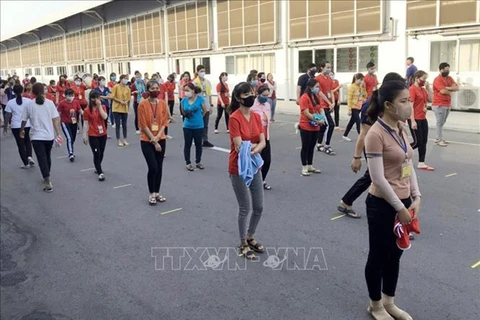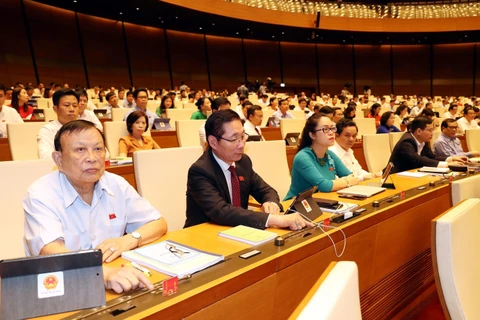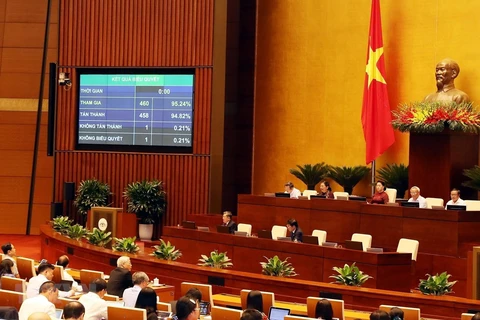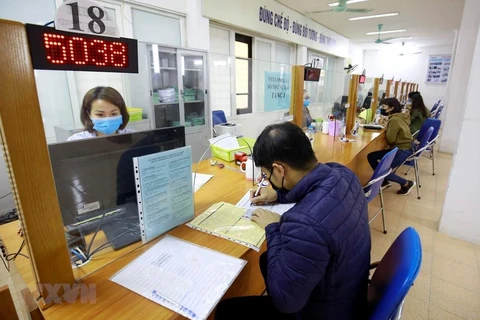 The National Assembly approves Convention 105 with 94.82 percent of deputies in agreement. (Photo: VNA)
The National Assembly approves Convention 105 with 94.82 percent of deputies in agreement. (Photo: VNA)
Hanoi (VNA) – With the National Assembly (NA) ratifying the International Labour Organisation (ILO)’s Convention 105 on Abolition of Forced Labour, Vietnam is proving its strong commitments to fighting the evil.
The NA voted to adopt the convention in Hanoi on June 8 with support from the majority of deputies. A year after the paperwork for Vietnam’s membership of the convention is finished, the international labour standard will come into force in the country.
ILO Director of International Labour Standards Department Corrine Vargha said via this ratification, Vietnam is demonstrating its firm commitment to combating all forms of forced labour.
“This ratification is all the more important since the ILO’s global estimates show the urgency of adopting immediate and effective measures to eradicate forced labour,” said Vargha.
“Moreover, by ratifying the Convention, Vietnam is moving towards the achievement of decent work and the delivering at the country-level of the 2030 UN Sustainable Development Goals, in particular SDG target 8.7.”
Forced labour can be understood as work that is performed involuntarily and under the menace of any penalty. It refers to situations in which persons are coerced to work through the use of violence or intimidation, or by more subtle means such as manipulated debt, retention of identity papers or threats of denunciation to immigration authorities.
Forced labour degrades human dignity and denies the worker the ability to pursue material well-being and spiritual development based on free will.
In most of the countries around the world today, the import of products made by forced labour is prohibited by laws. One type of forced labour – forced prison labour – is the only condition on the basis of which all the World Trade Organzation member states are expressly authorised to ban the import of goods produced using it. People of developed countries have adopted a habit of boycotting products related to forced labour.
The prevention of and combat against the use of forced labour in enterprises helps them avoid the risks of their products being rejected or boycotted by importing countries. The non-use of forced labour in the production of goods or services is also considered the “laissez-passer” for the goods and services to get access to global markets.
“The Government and social partners have been making consistent efforts in bettering its legal framework to pave the way for Vietnam to move towards an upper-middle income country in a sustainable manner,” said Director of ILO Vietnam Chang-Hee Lee.
According to labour experts, the membership of the Convention 105 suits the country’s process of refining its market economy mechanisms and realises the Party and State’s consistent policy of ensuring human rights amid global integration.
Truong Hong Son from the HCM City Labour Confederation said the Convention will bring many benefits to businesses and workers, promote harmonious and progressive ties between employers and employees, and provide a legal corridor to protect the legitimate rights and interests of workers in line with Vietnamese laws and international practice.
Of a similar mind, Director of the HCM City Support Centre Pham Binh An said that companies should learn about and explain labour standards and regulations to workers, to prevent forced labour from occurring.
Vietnam has to date ratified seven out of the ILO’s eight core conventions, covering four key areas, namely freedom of association and collective bargaining, forced labour, discrimination, and child labour./.
| According to ILO global estimates, there are 24.9 million victims of forced labour throughout the world. Among them, 16 million people are exploited in the private sector such as domestic work, construction or agriculture; 4.8 million persons in forced sexual exploitation; and 4 million persons in forced labour imposed by state authorities. In the private sector, forced labour generates 150 billion USD in illegal profits every year. |
























